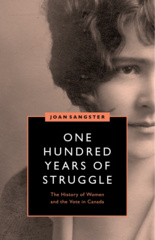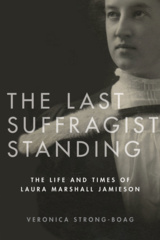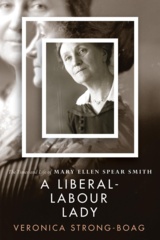
A Great Revolutionary Wave
Women and the Vote in British Columbia
Suffrage in British Columbia – and elsewhere in Canada – is best understood as a continuum rather than a clearly defined right “won” at one specific time. Although white settler women achieved the vote in 1917, after forty long years of activism, it would take another thirty years before the provincial government would remove race-based restrictions on voting rights.
British Columbia is often overlooked in the national story of women’s struggle for political equality. A Great Revolutionary Wave challenges that omission and the historical portrayal of suffragists as conservative, traditional, and polite. Lara Campbell follows the propaganda campaigns undertaken by suffrage organizations and traces the role of working-class women in the fight for political equality. She demonstrates the intimate connections between provincial and British suffragists and examines how racial exclusion and Indigenous dispossession shaped arguments and tactics for enfranchisement.
A Great Revolutionary Wave rethinks the complex legacy of suffrage by considering both the successes and limitations of women’s historical fight for political equality. That historical legacy remains relevant today as Canadians continue to grapple with the meaning of justice, inclusion, and equality.
This book is for readers interested in women’s history, British Columbia history, or the history of women’s fight for political equality, including secondary school and university students. It will also find an audience among those concerned with gender equality and social justice.
Awards
- 2021, Commended - Lieutenant Governor’s Medal for Historical Writing, British Columbia Historical Association
- 2021, Winner - Clio Awards (British Columbia), Canadian Historical Society
An excellent addition to the Canadian series Women’s Suffrage and the Struggle for Democracy, the volume is a meaningful contribution to the ongoing dialogue on human rights and social justice.
A core rationale for this book series, Lara Campbell explains, is the need to 'tell regional stories' about the women's suffrage movement. Campbell's regional focus is justified by her treatment of elections at the municipal level and for school boards.
...[A Great Revolutionary Wave] compellingly argues that the stories of women’s suffrage cannot be read in isolation without recognizing their intimate connections with the stories of all people who were discriminated against and denied the vote on account of race, ethnicity, religion, marital status, and other characteristics of their personal, social, and political identities.
Her book makes a valuable contribution to the understanding of herstory.
This critical new history interweaves the promise and power of the vote with its limits and exclusions. Through absorbing storytelling, rich illustrations, and compelling analysis, Lara Campbell brings suffrage to life and reveals how diverse women transformed British Columbia.
Lara Campbell’s riveting account of the campaign for suffrage in British Columbia is as astute as it is engaging. This exemplary work of history delivers a sobering message for the present day about the lengths people in power will go to maintain the status quo.
This book captures the complexity of first-wave feminism through a modern lens. Lara Campbell identifies paradoxical self-portraits of British Columbia as both pioneering West and colonial British standby, while revealing the women's suffrage movement as one of many parallel and intertwining activist dramas taking place on this fascinating stage.
Introduction
1 Suffrage and Reform
2 Building a Movement
3 The Anti-suffragists
4 Performing Politics
5 The Politics of Race
6 Labouring Women
7 A Global Movement
8 Achieving the Vote
9 Extending Suffrage
Conclusion
Sources and Further Reading; Index











